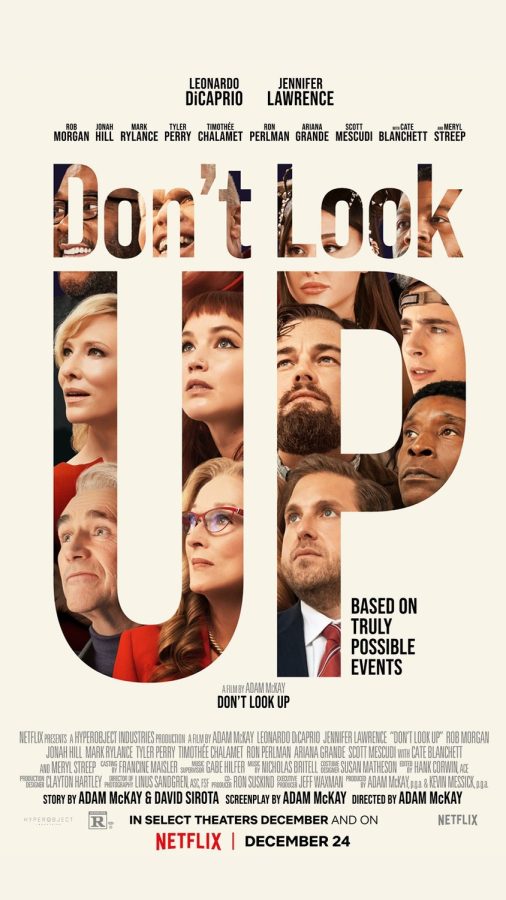Film Review: Netflix’s “Don’t Look Up”
“Don’t Look Up” came out on Dec. 24, 2021.
January 27, 2022
What would you do if someone told you the world was ending in two months? What about two years, or even 200 years?
In his new movie “Don’t Look Up,” which began streaming on Netflix on Dec. 24, director Adam McKay plays with this question. He brings that concept into the present, making a satirical jab at our distracted and narcissistic society.
McKay is truly a jack of all trades. He got his start as a head writer for SNL. After two seasons, he left the show and gained renown working alongside Will Ferrell. Many recognize his work with Ferrell, co-writing “Talladega Nights,” “Anchorman” and “Step Brothers,” to name a few.
In the last decade, McKay has demonstrated his range as a director, adding an element of drama into his more recent films. Beginning with “The Big Short” in 2015, followed by “Vice” in 2018, McKay developed a mastery that shines through in “Don’t Look Up.” His ability to combine the serious with the satirical leaves room for both to individually speak to the audience.
The film features a truly star-studded cast. Leonardo DiCaprio takes on the mantle of Dr. Randall Mindy, an astronomer and professor to graduate student Kate Dibiasky, who is played by Jennifer Lawrence. It is Kate who discovers the comet, which prompts her and Dr. Mindy to present their findings to President Orlean, played by Meryl Streep.
The film does not stop there, as it finds roles for Jonah Hill, Rob Morgan, Tyler Perry and Timothée Chalamet to add to the apocalyptic action.
True to her abilities, Streep’s portrayal of President Orlean is fantastic. It is clear that McKay gave her some room to run with the role, as she takes the Oval Office by storm with her uninterested and unprofessional portrayal of the president. However, sometimes Streep’s performance is a bit overplayed.
DiCaprio is another actor who shines in the film. His mannerisms as the astronomer Dr. Mindy are filled with trepidation that contrast his traditional roles in films like “The Wolf of Wall Street” and “The Great Gatsby,” which make it all the more enjoyable to watch.
While the film alone is purely entertaining, it does present underlying messages that add to the movie’s depth. The overarching theme of McKay’s work concerns the climate change crisis. While it is never specifically mentioned in the film, the comparison is meant to be obvious.
McKay utilizes scenes of nature as transitions throughout the feature. Short clips of a bee collecting pollen from a flower or of trees in a forest serve as a reminder that humans share the planet with numerous other living things. Real footage of a bear walking around in a supermarket and a polar bear clinging to melting ice feed into the narrative that the human-wrought climate crisis is robbing animals of their natural habitats and destroying the environment.
The movie touches on one of the problems that has seeped into the war against climate change, presenting the attempt of neoliberal capitalists to privatize the burgeoning green economy. Mark Rylance’s role as the CEO of BASH cellular, Peter Isherwell, pokes fun at the Jeff Bezoses and Elon Musks of the world, as they look to space as a profitable answer to Earth’s problems rather than focusing resources on combating the problems at home.
The film also takes obvious swings at American politics. McKay includes specific references to the 2016 and 2020 presidential election campaigns. The “Don’t Look Up” hats that President Orlean and her supporters don during the film give reference to the “Make America Great Again” hats worn by former President Donald Trump and his supporters.
A line uttered by Jonah Hill’s character, the president’s son, Jason Orlean reads “If she wasn’t my mother,” which jabs at former President Trump’s “If Ivanka weren’t my daughter, perhaps I’d be dating her.”
Near the conclusion of the movie, McKay does a fantastic job with the dinner table scene which stands in sharp contrast to the rest of the film. It shows the culmination of the truly stark reality that McKay’s film purports society is heading towards.
All in all, “Don’t Look Up” is a fabulously written ridicule of society with a strong enough cast and jokes that allow it to take off. The film uses the guise of a comet because humans often forget that the climate crisis is an apocalyptic threat. This feature leaves its audience wondering even after they turn off their TV: How can we stand a chance against problems that are long-term and “boring” by our standards?


